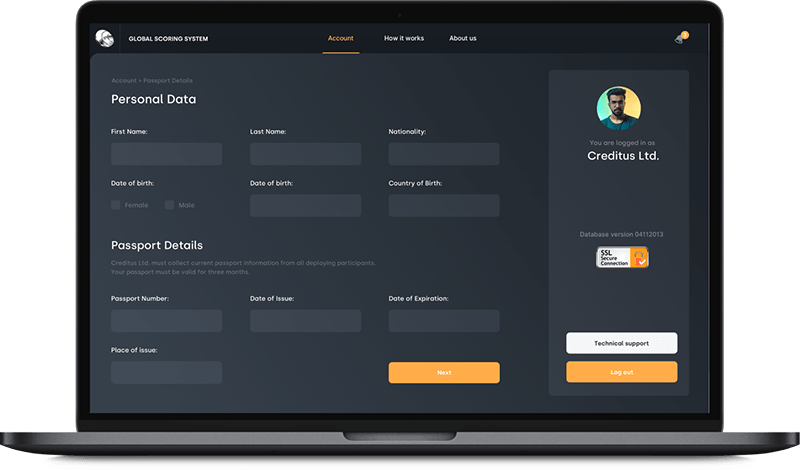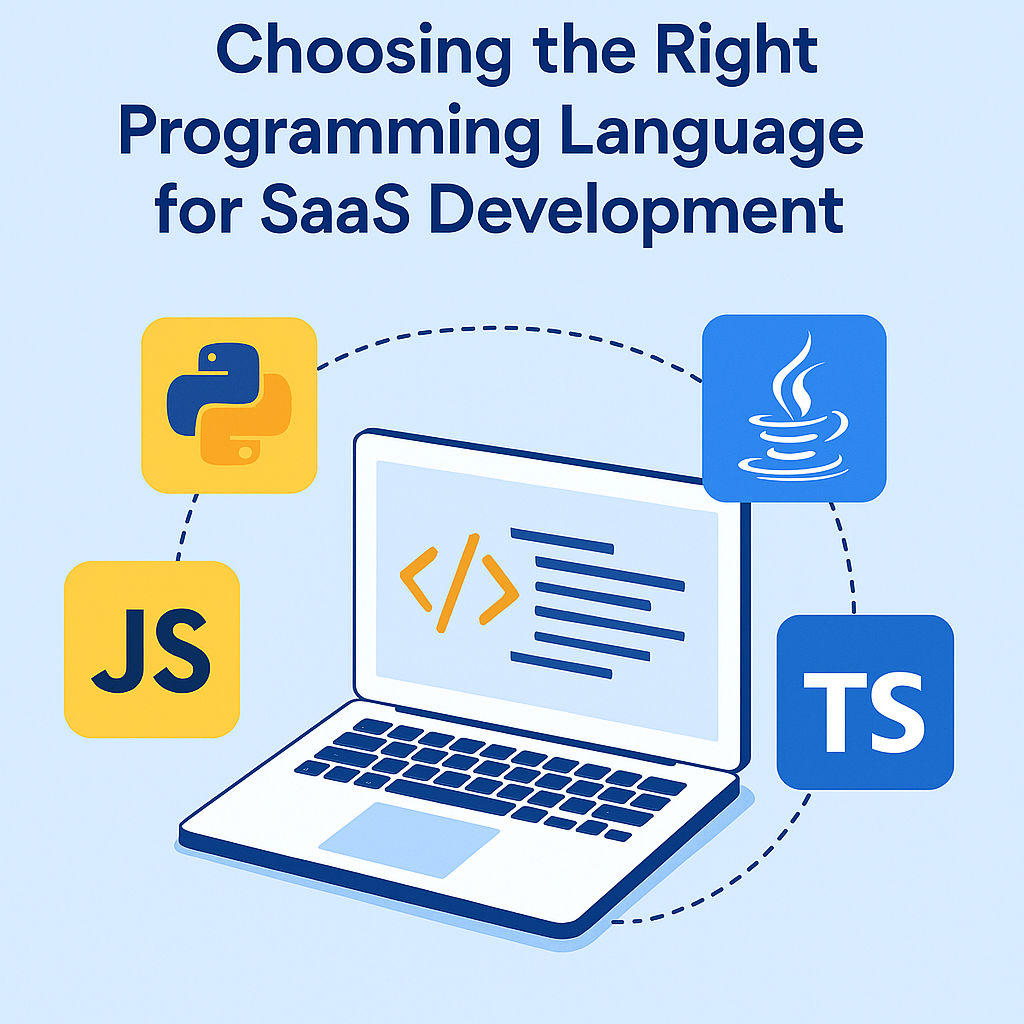
The system is a SaaS platform allowing the client to evaluate solvency and reliability of the potential borrowers using statistical methods of analysis of the historical and nontraditional data sources such as social network profiles and others. It allows the client to upload his normalized and anonymized database of previous loans data, build mathematical models and calculate the credit score of the future potential borrowers entering their data through the system’s web interface.
Creating a SaaS (Software as a Service) application is an exciting venture. You’re building a product that users will access and rely on daily, which means the foundation has to be rock-solid. The right programming language can make or break the project, impacting everything from development speed and scalability to maintenance and future upgrades.
So, how do you choose the best programming language for your SaaS application?
Let’s dig in and explore the top programming languages for SaaS development, along with the pros, cons, and real-world examples of each. By the end, you’ll be armed with the insights you need to make an informed decision.

Why Language Choice Matters in SaaS
The programming language you choose will shape your SaaS application’s structure, performance, and flexibility. Here’s why this decision is crucial:
- Scalability: SaaS applications need to handle an increasing load of users without compromising speed or functionality.
- Security: Your SaaS will be handling sensitive data, so the language’s security features are a top priority.
- Development Speed: Getting your product to market quickly can be vital in the competitive SaaS landscape.
- Maintenance and Upgradability: A clean, efficient language choice will ensure your app can be easily maintained and upgraded over time.
With these factors in mind, let’s explore some of the best programming languages for SaaS and see which ones might be a good fit for your project.
Top Programming Languages for SaaS Development
1. JavaScript (Node.js and Frontend Frameworks)
JavaScript is the go-to language for web development, and its versatility makes it a popular choice for SaaS development as well. With frameworks like Node.js, it enables full-stack development, allowing developers to use JavaScript for both the front end and the back end.
| Strengths | Weaknesses |
|---|---|
| Full-stack capabilities (Node.js) | Not ideal for CPU-intensive tasks |
| Large ecosystem and community support | Can lead to “callback hell” without proper management |
| Asynchronous programming for speed | Lacks some strict typing found in other languages |
Use Case: JavaScript (especially with Node.js) is ideal for SaaS apps that need real-time interactions, such as collaboration tools or messaging apps. Example: Slack and Asana both use JavaScript to support their interactive and responsive user experiences.
2. Python (Django, Flask)
Python’s readability and versatility have made it a popular language for startups and tech giants alike. It’s known for its clean syntax and is an excellent choice for data-driven SaaS applications. For companies seeking skilled developers, Python development services can help build scalable and secure SaaS solutions tailored to specific business needs.
| Strengths | Weaknesses |
|---|---|
| Easy to read and learn | Slower than compiled languages like Java or C++ |
| Great libraries for data processing | Limited options for multi-threading |
| Strong community and open-source support | Can consume more memory for larger applications |
Use Case: Python is ideal for SaaS applications that rely heavily on data analytics, machine learning, or natural language processing. Example: Dropbox initially used Python to build its file storage and sharing system.
3. Java
Java is a powerhouse in software development, especially for applications that require high performance, scalability, and security. It has a long history in building enterprise-level applications and remains a top choice for SaaS due to its stability.
| Strengths | Weaknesses |
|---|---|
| High performance and scalability | Verbose syntax can slow development |
| Strong multithreading capabilities | Learning curve is steeper for beginners |
| Cross-platform compatibility | Requires more memory for basic operations |
Use Case: Java is often chosen for large, complex SaaS applications that require extensive backend processing, such as financial platforms or enterprise resource planning (ERP) systems. Example: Netflix uses Java to handle millions of streaming requests daily, relying on its scalability and performance.
4. Ruby (Ruby on Rails)
Ruby, paired with its powerful Rails framework, offers a productive environment for rapid development. Ruby on Rails emphasizes convention over configuration, making it easy to get a SaaS product up and running quickly.
| Strengths | Weaknesses |
|---|---|
| Fast development speed | Performance issues with large-scale apps |
| Rails framework streamlines development | Not ideal for high concurrency applications |
| Focuses on simplicity and readability | Can be slower for compute-heavy operations |
Use Case: Ruby on Rails is excellent for startups and SaaS products that need to be launched quickly with a minimum viable product (MVP) approach. Example: Shopify, a major SaaS e-commerce platform, uses Ruby on Rails to build and scale its online stores for millions of merchants.
5. PHP (Laravel, Symfony)
PHP has been around for decades and powers many web applications worldwide. With frameworks like Laravel, PHP offers a modern development experience, making it a solid choice for content-heavy SaaS applications.
| Strengths | Weaknesses |
|---|---|
| Wide adoption and community support | Less efficient in handling real-time updates |
| Strong database integration | Historically known for security vulnerabilities |
| Laravel offers a clean, modern framework | Slower than newer languages like Node.js |
Use Case: PHP is suited for SaaS products with a focus on content, such as membership sites, blogging platforms, or customer portals. Example: WordPress, the world’s most popular CMS, uses PHP, making it a reliable option for SaaS tools that require content management.
6. C# (ASP.NET)
C# is a robust language, especially when used with Microsoft’s ASP.NET framework. This language is known for its high performance and seamless integration with Windows-based infrastructure, making it ideal for enterprise SaaS solutions.
| Strengths | Weaknesses |
|---|---|
| Excellent performance and scalability | Requires a Windows server environment |
| Strong security features | Slightly higher hosting costs |
| Great for building complex business logic | Steeper learning curve for those unfamiliar with .NET |
Use Case: C# is perfect for enterprise-grade SaaS applications that need to run in a secure, managed environment, such as financial management tools or HR systems. Example: Many corporate intranets and CRM platforms are built with C# and ASP.NET for their robust security and performance capabilities.
Comparing Languages: Finding the Right Fit
Here’s a quick comparison table to help you see how each language stacks up for SaaS development:
| Language | Best For | Performance | Development Speed | Community Support |
|---|---|---|---|---|
| JavaScript | Real-time, full-stack apps | High | Fast | Very Strong |
| Python | Data-driven, AI/ML applications | Moderate | Fast | Very Strong |
| Java | Enterprise-level, scalable systems | Very High | Moderate | Strong |
| Ruby | MVP development, startups | Moderate | Very Fast | Strong |
| PHP | Content-heavy platforms | Moderate | Fast | Strong |
| C# | Secure, enterprise solutions | Very High | Moderate | Strong (Microsoft) |
Key Considerations When Choosing a Language for SaaS
Choosing the right programming language for your SaaS project depends on several factors, and these often come down to your specific project needs and goals. Here are some critical considerations:
- Scalability: Will your app need to support thousands or even millions of users? Languages like Java and C# are known for their scalability and are often chosen for applications that require intensive processing power and multi-threaded capabilities.
- Time to Market: If speed is essential for your SaaS launch, you may benefit from languages that prioritize rapid development, like Ruby (with Ruby on Rails) or Python. These languages allow for faster prototyping and launching, which can be critical for startups looking to release an MVP quickly.
- Performance Requirements: For SaaS applications that rely on real-time interactions, such as collaborative platforms or messaging apps, JavaScript with Node.js is an excellent choice due to its asynchronous capabilities. For high-performance requirements, languages like Java and C# are often preferred for their efficiency in handling complex computations.
- Security and Compliance: SaaS applications often deal with sensitive data, which means security should be a top priority. Languages like Java and C# offer strong security features, while PHP, though versatile, may require extra security measures. Compliance with regulations like GDPR or HIPAA should also be factored into the decision.
- Community and Ecosystem: The strength of a language’s ecosystem and community support is essential, as it means more readily available libraries, plugins, and community-driven improvements. For example, JavaScript and Python have vast communities, which can accelerate development and troubleshooting.
- Budget Constraints: Finally, your budget can influence the choice of language. Some languages, like JavaScript and PHP, are generally more affordable to develop and maintain, while languages like C# may come with higher hosting or licensing costs, especially for enterprise-level projects on Windows infrastructure.
Real-World Case Studies: SaaS Success Stories
- Slack: Built using JavaScript and Node.js, Slack’s real-time messaging capabilities and seamless user experience highlight JavaScript’s strengths in creating responsive SaaS platforms that rely on fast updates and data synchronization.
- Shopify: Shopify’s use of Ruby on Rails enabled it to scale quickly and effectively as one of the leading e-commerce SaaS platforms. The speed of Ruby on Rails development allowed Shopify to launch fast and iterate based on user feedback, becoming a powerhouse for small and large online stores alike.
- Netflix: Netflix uses Java to power its backend, handling millions of user requests every day. Java’s robustness and scalability support Netflix’s streaming platform, delivering smooth experiences to a global audience.
Final Thoughts
Choosing a programming language for SaaS development is a strategic decision that will impact the product’s longevity, performance, and scalability. The right language depends on your project’s specific requirements, including scalability, performance, security, and speed of development. Remember, there’s no universally “best” language; rather, it’s about finding the best fit for your needs.
If you’re ready to embark on your SaaS journey but need guidance in choosing the right technology stack, consulting with experts can make all the difference. At Itexus, we specialize in building tailored SaaS applications and can help you select the ideal programming language to meet your business goals. From initial strategy to final deployment, we ensure that your SaaS solution is efficient, scalable, and aligned with your vision.
Are you ready to bring your SaaS idea to life? Reach out to our team for a consultation, and let’s turn your vision into a market-ready solution!